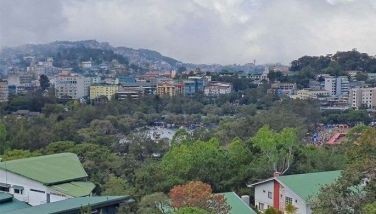UST expels 8 students over Atio hazing death

“The (UST) confirmed that the committee tasked to investigate the death of Mr. Horacio Castillo III has issued its first resolution finding eight law students guilty of violating the Code of Conduct and Discipline and imposing the supreme penalty of expulsion,” the statement said, without naming the eight students. Photo from Horacio Tomas Castillo III's Facebook
MANILA, Philippines — The University of Santo Tomas (UST) has decided to expel eight students from the Faculty of Civil Law for the death of freshman Horacio “Atio” Castillo III from injuries sustained during hazing rites of law school-based fraternity Aegis Juris.
In a statement released to the school’s official student publication The Varsitarian, the UST administration said the decision came after an investigation of a committee it formed to look into the death of Castillo.
“The (UST) confirmed that the committee tasked to investigate the death of Mr. Horacio Castillo III has issued its first resolution finding eight law students guilty of violating the Code of Conduct and Discipline and imposing the supreme penalty of expulsion,” the statement said, without naming the eight students.
The committee, formed by UST Rector Fr. Herminio Dagohoy, OP, last Sept. 19, was composed of six administrators and a representative from the Central Student Council.
“It conducted hearings in the presence of representatives from the Legal Education Board (LEB). It observed the due process requirements under university policies and pertinent LEB guidelines. It shall continue its investigation until all students who were involved in the hazing incident are held administratively liable,” the UST administration said.
It noted that along with the formation of the investigating committee, the university had closely coordinated with the Manila Police District and National Bureau of Investigation, which led to the early identification of the offenders and the filing of charges before the Department of Justice (DOJ).
The UST also submitted reports and pertinent documents to the LEB, the Senate as well as the Commission on Higher Education, and also sent authorized representatives to the Senate hearings, according to the statement.
The university, which boasts of being one of the top four universities in the country, had earlier been besieged with criticisms for its seeming indifference or lack of interest in the death of Castillo, especially in the initial aftermath when news of the law student’s death broke in media.
The outrage over the death of Castillo during initiation rites of the Aegis Juris has also put UST Faculty of Civil Law dean Nilo Divina on the defensive, since he is also a member of the fraternity.
Last Jan. 23, the Senate committee on public order and justice, which had conducted an inquiry in aid of legislation on the death of Castillo, called for the disbarment of Divina and 18 other lawyers, and his resignation as dean of the law school.
In the same statement, the UST reiterated that it is committed “to ferret out the truth, determine liability and impose the appropriate sanctions.”
“In the Eucharistic Celebrations held at the UST Faculty of Civil Law, at the Santuario de San Antonio during the wake and at the UST Chapel during the day of mourning for the death of Horacio, UST has always been one with the Castillo family in the steadfast call for everyone to pray and work together to achieve justice for Horacio and for truth to prevail,” the university said.
It also said that last October, its Office for Student Affairs (OSA) conducted a university-wide seminar on Republic Act 8049 or the anti-hazing law for organization advisers and student leaders.
In the wake of the incident, the university recommended a comprehensive review of the Student Handbook and the accreditation process for organizations, and issued an indefinite moratorium on the recruitment and all other activities of all fraternities and sororities in the institution.
Case timeline
Castillo’s body, which was covered with a blanket, was found by medical technologist John Paul Solano lying on a pavement at the corner of H. Lopez Blvd. and Infanta Street in Balut, Tondo, Manila at 7:50 a.m. last Sept. 17.
A red Mitsubishi Strada brought the then-unidentified body to the Chinese General Hospital, where he was declared dead on arrival almost two hours later.
In the evening of the same day, Castillo’s parents received an anonymous text that told them where their son was brought to hospital, but the Castillos found their son at the Archangel Funeral Home in Sampaloc, Manila.
The next day, Manila Police District (MPD) spokesman Supt. Erwin Margarejo said Castillo’s death “was caused by cardiac or respiratory arrest, triggered by traumatic injuries,” but the victim’s father told radio station dzMM in an interview that he believes his son died during hazing rites, explaining that the latter was recruited to join the Aegis Juris fraternity.
Hematoma on both upper arms as well as candle wax drip marks were found all over Castillo’s body, according to the police report.
Divina issued a preventive suspension order on officers and members of the fraternity that afternoon.
On Sept. 19, six “persons of interest” in the case – including Solano, who was later found to be an Aegis Juris frat member and became a primary suspect – were identified by the police.
Sen. Juan Miguel Zubiri then called for an investigation into Castillo’s death through Senate Resolution No. 504.
On Sept. 20, the MPD tagged Antonio Trangia, who was linked to the red Mitsubishi Strada that brought Castillo to the hospital, and his son Ralph, an Aegis Juris officer, as primary suspects.
In the ensuing weeks and months, various personalities involved in the incident, particularly those directly affiliated with the fraternity, were put on lookout bulletin orders issued by the Bureau of Immigration on departures from and arrivals to the country.
Screenshots of Facebook Messenger chats among alleged Aegis Juris members on Sept. 16-17 that were linked to the hazing were also made public.
On Sept. 22, Solano turned himself in to Sen. Panfilo Lacson. Solano, who said he was not at the initiation rites and that his participation was limited only to providing “medical assistance” when needed, was then turned over to the MPD.
During a Senate hearing on Sept. 25, Castillo’s parents condemned the killing of their son, with his father lamenting over how Aegis Juris treated their son “like an animal.”
On the same day, Solano was charged by the MPD with perjury, murder, robbery, obstruction of justice and violation of the anti-hazing law, while 16 others, along with some identified members of the Aegis Juris and its sister organization, the Regina Legis et Juris sorority, were charged with murder, robbery and anti-hazing law violation.
On Sept. 27, Castillo was laid to rest at the Manila Memorial Park in Parañaque as the DOJ ordered the release of Solano.
On Oct. 4, Castillo’s parents met with President Duterte at Malacañang, where the latter assured them that justice would be served.
On Oct. 9, Castillo’s parents accused Divina of murder and violation of the anti-hazing law. They said the dean supposedly took part in a cover-up of the incident.
On Oct. 18, Solano pinpointed Arvin Balag as the head of Aegis Juris. During the hearing, the Senate cited Balag in contempt for evading questions and ordered his detention.
On Oct. 24, Solano said Castillo “may have died of a pre-existing heart condition, and not of hazing injuries,” while another Aegis Juris fraternity member, suspect and would-be state witness Mark Ventura, admitted participating in the initiation.
On the evening of Dec. 22, the Senate freed Balag from detention “in the spirit of Christmas.”
Early last month, the DOJ reopened the hazing case after it was submitted for resolution late last year to give way to the sworn statement of Ventura.
In a 46-page report of committees on public order and dangerous drugs, and on justice and human rights, signed by two Senate committees probing the case, it was concluded that Castillo died of hazing and recommended to the Supreme Court the disbarment of Divina for the “mockery of the legal profession.”
- Latest
- Trending































